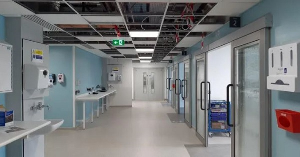The President of the Non-Governmental Organizations (NGOs) in Health, Bright Amissah Nyarko, has condemned the behavior of some healthcare workers in Ghana’s health facilities.
He emphasised that many of these workers have adopted an “I don’t care” attitude.
Nyarko expressed disappointment over the lack of empathy and professionalism exhibited by some healthcare providers, which can discourage patients from seeking medical care.
“The ‘I don’t care’ attitude in our health facilities is too much,” he stated while speaking at Media General’s Health Forum, themed “State and Future of Health Facilities: Reimagining Healthcare in Ghana,” held on May 7, 2025.
He stressed the need for healthcare workers to adopt a more patient-centered approach, prioritising empathy, respect, and compassion in their interactions with patients.
Additionally, Nyarko called on duty bearers to focus on expanding Community Health Planning Service (CHPS) Compounds and district hospitals.
He noted that the current CHPS compounds and district hospitals are under significant pressure due to patient numbers exceeding their capacities.
“A lot of focus and resources should be invested in our CHPS Compounds and District hospitals. The majority of people who rely on these facilities outweigh the available resources,” he added.
Nyarko’s concerns highlight the necessity for healthcare facilities to prioritize patient care and dignity.
In a related statement, the President of the Ghana Registered Nurses and Midwives Association (GRNMA), Perpetual Ofori-Ampofo, lamented the poor conditions of health facilities in the country.
While recognising that institutions like the University of Ghana Medical Center (UGMC) are in better shape, she questioned why many health facilities have been neglected by successive governments, according to 3news.
She asserted that many governments have made little effort to improve health facility conditions throughout the country.
Ofori-Ampofo pointed out that health infrastructure, equipment for professionals, and drainage systems in hospitals are often inadequate, making it difficult for health professionals to feel comfortable working in these facilities.
“When you take health facilities, when you move from the capitals, the regions, and go to the districts, and then move lower down to the health centre CHPS compounds, these facilities are actually not in the best of shape. Even with some of those facilities within our capitals, the regional hospitals and the teaching hospitals, it is not in the best shape,” she stated.
According to her, health facilities across the country do not receive adequate funding from the government and instead rely on internally generated funds.
This reliance has hindered the improvement of healthcare facilities nationwide.
“As we speak now, all our health facilities rely on internally generated funds (IGF), which is why he was showing the stats you saw that OPD services up to about 99% need to be paid for,” she added.
She urged the government to pay closer attention to these health facilities and provide the necessary resources for improvement.
When patients feel valued and respected, they are more likely to trust their healthcare providers and adhere to treatment plans, ultimately leading to better health outcomes.
NAD/KA
You can also watch an exclusive interview with Ayisi on the latest edition of Talkertainment below:



